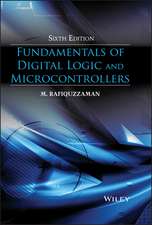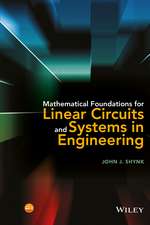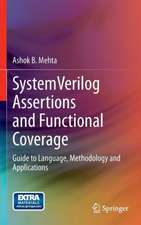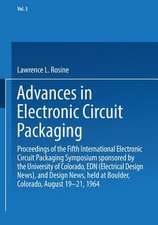Constellation Shaping, Nonlinear Precoding, and Trellis Coding for Voiceband Telephone Channel Modems: with Emphasis on ITU-T Recommendation V.34: The Springer International Series in Engineering and Computer Science, cartea 673
Autor Steven A. Tretteren Limba Engleză Paperback – 31 oct 2012
The author presents the theory behind the new modulation and coding techniques included in ITU-T Recommendation V.34. Topics discussed include signal constellation shaping by shell mapping, nonlinear precoding, four-dimensional trellis codes, and fast equalizer training by using periodic sequences and FFT methods. In addition, several approaches that were considered but not accepted are presented including trellis shaping, trellis precoding, and modulus conversion.
| Toate formatele și edițiile | Preț | Express |
|---|---|---|
| Paperback (1) | 639.73 lei 6-8 săpt. | |
| Springer Us – 31 oct 2012 | 639.73 lei 6-8 săpt. | |
| Hardback (1) | 647.40 lei 6-8 săpt. | |
| Springer Us – 31 mar 2002 | 647.40 lei 6-8 săpt. |
Din seria The Springer International Series in Engineering and Computer Science
- 24%
 Preț: 1041.97 lei
Preț: 1041.97 lei - 20%
 Preț: 643.50 lei
Preț: 643.50 lei - 18%
 Preț: 1225.62 lei
Preț: 1225.62 lei - 18%
 Preț: 965.02 lei
Preț: 965.02 lei - 20%
 Preț: 646.12 lei
Preț: 646.12 lei - 18%
 Preț: 948.79 lei
Preț: 948.79 lei - 20%
 Preț: 646.62 lei
Preț: 646.62 lei - 15%
 Preț: 637.46 lei
Preț: 637.46 lei - 20%
 Preț: 643.83 lei
Preț: 643.83 lei - 18%
 Preț: 949.23 lei
Preț: 949.23 lei - 20%
 Preț: 644.48 lei
Preț: 644.48 lei - 20%
 Preț: 994.92 lei
Preț: 994.92 lei - 20%
 Preț: 645.97 lei
Preț: 645.97 lei - 18%
 Preț: 946.87 lei
Preț: 946.87 lei - 20%
 Preț: 995.57 lei
Preț: 995.57 lei - 18%
 Preț: 956.99 lei
Preț: 956.99 lei - 20%
 Preț: 644.98 lei
Preț: 644.98 lei - 15%
 Preț: 649.54 lei
Preț: 649.54 lei - 18%
 Preț: 950.21 lei
Preț: 950.21 lei - 18%
 Preț: 1221.38 lei
Preț: 1221.38 lei - 18%
 Preț: 957.62 lei
Preț: 957.62 lei - 15%
 Preț: 643.99 lei
Preț: 643.99 lei - 18%
 Preț: 948.47 lei
Preț: 948.47 lei - 18%
 Preț: 947.35 lei
Preț: 947.35 lei - 20%
 Preț: 1284.65 lei
Preț: 1284.65 lei - 20%
 Preț: 1628.31 lei
Preț: 1628.31 lei - 20%
 Preț: 1285.78 lei
Preț: 1285.78 lei
Preț: 639.73 lei
Preț vechi: 752.63 lei
-15% Nou
Puncte Express: 960
Preț estimativ în valută:
122.41€ • 128.13$ • 101.89£
122.41€ • 128.13$ • 101.89£
Carte tipărită la comandă
Livrare economică 31 martie-14 aprilie
Preluare comenzi: 021 569.72.76
Specificații
ISBN-13: 9781461353393
ISBN-10: 1461353394
Pagini: 284
Ilustrații: XIV, 266 p.
Dimensiuni: 155 x 235 x 15 mm
Greutate: 0.4 kg
Ediția:Softcover reprint of the original 1st ed. 2002
Editura: Springer Us
Colecția Springer
Seria The Springer International Series in Engineering and Computer Science
Locul publicării:New York, NY, United States
ISBN-10: 1461353394
Pagini: 284
Ilustrații: XIV, 266 p.
Dimensiuni: 155 x 235 x 15 mm
Greutate: 0.4 kg
Ediția:Softcover reprint of the original 1st ed. 2002
Editura: Springer Us
Colecția Springer
Seria The Springer International Series in Engineering and Computer Science
Locul publicării:New York, NY, United States
Public țintă
Professional/practitionerCuprins
1. Basics of Lattice Theory.- 1.1. Definition of a Lattice.- 1.2. Examples of Lattices.- 1.3. Sublattices. Lattice Partitions, and Cosets.- 1.4. Binary Lattices and Coset Representatives.- 1.5. Fundamental Regions and Volumes, and Voronoi Regions.- 1.6. Point Spacing, Weight Distributions, and Theta Series.- 1.7. Fundamental Coding Gain.- 2. Performance Measures for Multidimensional Constellations.- 2.1. Introduction.- 2.2. Constellation Figure of Merit and Symbol Error Probabilities.- 2.3. Constituent 2D Constellations and Constellation Expansion Ratio.- 2.4. Peak-to-Average Power Ratio.- 2.5. Representing CFM(C) in Terms of Coding Gain and Shaping Gain.- 2.6. Coding and Shaping Factors of the Constellation Expansion Ratio.- 2.7. Factors of the Peak-to-Average Power Ratio.- 2.8. Optimum Tradeoffs of Shaping Gain with CERS and PAR.- 3. Principles of Convolutional and Trellis Codes.- 3.1. The Huffman D-Transform.- 3.2. Transfer Functions and Realizations.- 3.3. Description of a Convolutional Code by its Generator Matrix.- 3.4. Systematic Form of a Convolutional Code.- 3.5. The Parity Check Matrix and Syndromes.- 3.6. Inverse Check Matrix or Inverse Syndrome Former.- 3.7. The Code Trellis.- 3.8. Weight Distributions and Error Correction Properties.- 3.9. Trellis Coded Modulation (TCM).- 3.10. Brief Review of the Viterbi Decoding Algorithm.- 3.11. The Fundamental Coding Gain of a Trellis Code.- 4. Trellis Shaping.- 4.1. Trellis Shaping Based on Lattice Partitions.- 4.2. Trellis Shaping on Regions.- 5. Nonlinear Precoding Methods to Remove Intersymbol Interference.- 5.1. Tomlinson/Harashima Precoding.- 5.2. LTF/Motorola/GDC Precoding.- 5.3. Precoding and Noise Whitening.- 6. Trellis Precoding.- 6.1. Trellis Precoding Based on Shaping on Regions.- 6.2. Trellis Precoding Based on Lattice Partitions and Linear Codes.- 6.3. Experimental Performance Results.- 7. Mapping Data to Channel Symbol Frames by a Modulus Encoder.- 7.1. The AT&T Fractional Bit Rate Modulus Converter.- 7.2. The V.90 Modulus Encoder.- 8. Constellation Shaping by Shell Mapping.- 8.1. General System Description.- 8.2. Ring Weights and the Number of Frames of Each Weight.- 8.3. Lexicographical Ordering of Ring Frames.- 8.4. The Decoding Algorithm.- 8.5. The Encoding Algorithm.- Appendix 8.A. Justification for the Motorola Weight Function.- Appendix 8.B. Shell Mapping Program.- 9. The Four Dimensional Constellation Used by Itu-T V.34 Modems.- 9.1. The 2D Constellation and its Partitioning.- 9.2. Framing.- 9.3. The 4D Constellation.- 10. The Combined Precoding and Trellis Coding Scheme for V.34.- 10.1. The Nonlinear Precoder.- 10.2. The Trellis Encoders.- 10.3. Viterbi Decoding of 4D Trellis Codes.- 10.4. More Details on the Wei 16-State Code.- 10.5. Using the Modulo Encoder to Make y(n) a Trellis Sequence.- 10.6. Superframe Synchronization.- 10.7. Receiver Operation.- 11. Fast Equalizer Adjustment by Using A Periodic Training Sequence.- 11.1. The V.34 Periodic Training Sequence.- 11.2. The Optimal Fractionally Spaced Equalizer.- 11.3. Finding the Initial Equalizer Taps by Using the FFT.- References.



















